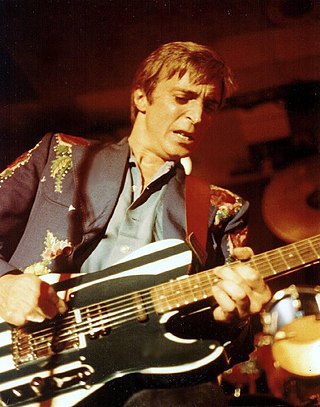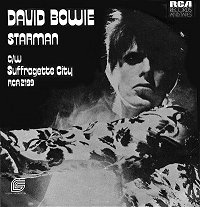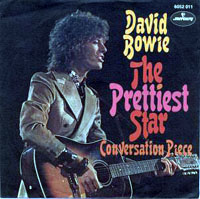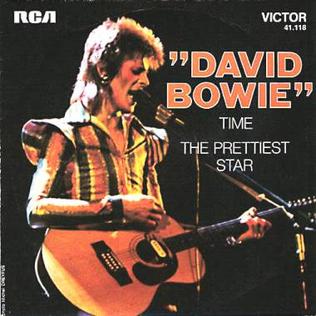Related Research Articles

Michael Ronson was an English musician, songwriter, arranger, and producer. He achieved critical and commercial success working with David Bowie as the guitarist of the Spiders from Mars. He was a session musician who recorded five studio albums with Bowie followed by four with Ian Hunter, and also worked as a sideman in touring bands with Van Morrison and Bob Dylan. A classically trained musician, Ronson was known for his melodic approach to guitar playing.

"Suffragette City" is a song by the English singer-songwriter David Bowie. It was originally released in April 1972 as the B-side of the single "Starman" and subsequently appeared on his fifth studio album The Rise and Fall of Ziggy Stardust and the Spiders from Mars (1972). The song was later reissued as a single in 1976, with the US single edit of "Stay" as the B-side, to promote the compilation album Changesonebowie in the UK. Co-produced by Bowie and Ken Scott, it was recorded by Bowie at Trident Studios in London with his backing band the Spiders from Mars, consisting of Mick Ronson, Trevor Bolder and Mick Woodmansey, at a late stage of the album's sessions. The song was originally offered to English band Mott the Hoople, who declined it and recorded Bowie's "All the Young Dudes" instead. It is a glam rock song that is influenced by the music of Little Richard and the Velvet Underground. The lyrics include a reference to Anthony Burgess' novel A Clockwork Orange and the lyric "Oooohh wham bam, thank you, ma'am".

The Man Who Sold the World is the third studio album by the English musician David Bowie, originally released through Mercury Records in the United States on 4 November 1970 and in the United Kingdom on 10 April 1971. Produced by Tony Visconti and recorded in London from April to May 1970, the album features the first appearances on a Bowie record of future Spiders from Mars members Mick Ronson and Mick Woodmansey.

"Starman" is a song by the English musician David Bowie. It was released on 28 April 1972 by RCA Records as the lead single of his fifth studio album The Rise and Fall of Ziggy Stardust and the Spiders from Mars. Co-produced by Ken Scott, Bowie recorded the song on 4 February 1972 at Trident Studios in London with his backing band known as the Spiders from Mars – comprising guitarist Mick Ronson, bassist Trevor Bolder and drummer Mick Woodmansey. The song was a late addition to the album, written as a direct response to RCA's request for a single; it replaced the Chuck Berry cover "Round and Round" on the album. The lyrics describe Ziggy Stardust bringing a message of hope to Earth's youth through the radio, salvation by an alien "Starman". The chorus is inspired by "Over the Rainbow", sung by Judy Garland, while other influences include T. Rex and the Supremes.
"The Man Who Sold the World" is a song by the English singer-songwriter David Bowie. The title track of Bowie's third studio album, it was released in November 1970 in the US and in April 1971 in the UK by Mercury Records. Produced by Tony Visconti, it was recorded at Trident and Advision Studios in London in May 1970, towards the end of the album's sessions; Bowie recorded his vocal on the final day of mixing for the album, reflecting his generally dismissive attitude during the sessions. Musically, it is based around a "circular" guitar riff from Mick Ronson. Its lyrics are cryptic and evocative, being inspired by numerous poems including the 1899 "Antigonish" by William Hughes Mearns. Bowie's vocals are heavily "phased" throughout and have been described as "haunting".

"The Prettiest Star" is a song by the English musician David Bowie, originally released on 6 March 1970 through Mercury Records as the follow-up single to "Space Oddity". A love song for his soon-to-be wife Angie, it was recorded in January 1970 at Trident Studios in London and featured Marc Bolan on guitar, who was brought on by producer Tony Visconti. Despite praise from music journalists, the single flopped and failed to chart. Years later, Bowie rerecorded the track for his 1973 album Aladdin Sane. A more glam rock influenced take with lyrics matching themes on the album, Mick Ronson recreated Bolan's guitar part almost note-for-note. The remake was more well-received.

"John, I'm Only Dancing" is a song by the English musician David Bowie, originally released as a non-album single on 1 September 1972. A glam rock and R&B number, the lyrics describe a situation in which the narrator informs his lover not to worry about the girl he is with because he is "only dancing" with her. Although ambiguous, many interpreted it as concerning a gay relationship. Recorded in London in June 1972, it was boosted by a low-budget promotional video directed by Mick Rock. It reached number 12 in the UK; RCA refused to release it in America due to its suggestive lyrical content.

"Rock 'n' Roll Suicide" is a song by the English singer-songwriter David Bowie, originally released as the closing track on the album The Rise and Fall of Ziggy Stardust and the Spiders from Mars on 16 June 1972. Co-produced by Ken Scott, Bowie recorded it with his backing band the Spiders from Mars – comprising Mick Ronson, Trevor Bolder and Mick Woodmansey. It detailed Ziggy's final collapse like an old, washed-up rock star and, as such, was also the closing number of the Ziggy Stardust live show. In April 1974 RCA issued it as a single.
"The Width of a Circle" is a song written by the English musician David Bowie in 1969 for his 1970 album, The Man Who Sold the World. Recorded during the spring of 1970, it was released later that year in the United States and in April 1971 in the UK. The opening track on the album, it features hard rock and heavy metal overtones. Bowie had performed a shorter version of the song in concerts for several months before recording it.
"Black Country Rock" is a song by the English musician David Bowie, released on his 1970 album The Man Who Sold the World. The song was recorded in May 1970, with sessions taking place at Trident and Advision Studios in London. The lineup featured Bowie on lead vocals, guitarist Mick Ronson, bassist/producer Tony Visconti, drummer Mick Woodmansey and Ralph Mace on Moog synthesiser. The track was mostly composed by Ronson and Visconti, who developed it using a basic song sketch from Bowie. Labelled under the working title "Black Country Rock", Bowie used the title to write the lyrics towards the end of the sessions, resulting in a repeated two-line verse and chorus. A blues rock and hard rock number, Bowie imitates T. Rex's Marc Bolan in his vocal performance.
"After All" is a song written by the English singer-songwriter David Bowie in 1970 for the album The Man Who Sold the World, released later that year in the United States and in April 1971 in the UK. One of a number of Bowie songs from the early 1970s reflecting the influence of Friedrich Nietzsche and Aleister Crowley, it has been described by biographer David Buckley as "the album's hidden gem", and by Nicholas Pegg as "one of Bowie's most underrated recordings".
"She Shook Me Cold" is a song written by the English singer-songwriter David Bowie in 1970 for the album The Man Who Sold the World. Mick Ronson's solo guitar is influenced by hard rock as played by Cream, Led Zeppelin and Jeff Beck. Although solely credited to Bowie, this and other songs from the album were constructed around jams by all of the musicians. Tony Visconti, who played bass on the track in addition to producing the entire album, was quoted as saying, "The songs were written by all four of us. We'd jam in a basement, and Bowie would just say whether he liked them or not."
"The Supermen" is a song written by the English singer-songwriter David Bowie in 1970 and released as the closing track on the album The Man Who Sold the World. It was one of a number of pieces on the album inspired by the works of literary figures such as Friedrich Nietzsche and H. P. Lovecraft.
"Lady Stardust" is a song written by the English singer-songwriter David Bowie that appeared on the album The Rise and Fall of Ziggy Stardust and the Spiders from Mars (1972). Co-produced by Ken Scott, Bowie recorded it with his backing band the Spiders from Mars – comprising Mick Ronson, Trevor Bolder and Mick Woodmansey. The song is generally interpreted as alluding to fellow glam rock icon Marc Bolan. The original demo version was entitled "He Was Alright ". A 4-track demo version of the song was sold as a picture disc single during the "David Bowie Is" exhibition in Japan in 2017.
"Watch That Man" is a song by the English musician David Bowie, the opening track on the album Aladdin Sane from 1973. Its style is often compared to the Rolling Stones' Exile on Main Street. The mix, in which Bowie's lead vocal is buried within the instrumental sections, has generated discussion among critics and fans.
"Panic in Detroit" is a song written by the English singer-songwriter David Bowie for the album Aladdin Sane in 1973. Bowie based it on his friend Iggy Pop's descriptions of revolutionaries he had known in Michigan and Pop's experiences during the 1967 Detroit riots. Rolling Stone magazine called the track "a paranoid descendant of the Motor City's earlier masterpiece, Martha and the Vandellas' "Nowhere to Run"".

"Time" is a song by the English singer-songwriter David Bowie. Written in New Orleans in November 1972 during the American leg of the Ziggy Stardust Tour, it was recorded in London in January 1973 and released as the opening track on side two of the album Aladdin Sane that April. An edited version of the song supplanted the release of the single "Drive-In Saturday" in the United States, Canada and Japan. It was also released in France and South Africa, while early Spanish copies of David Live included a free copy of the single.
"Lady Grinning Soul" is a song by the English musician David Bowie, released on the album Aladdin Sane in 1973. It was a last-minute addition, replacing the "sax version" of "John, I'm Only Dancing" as the closing track. The composer's first meeting with American soul singer Claudia Lennear in 1972 is often cited as the inspiration for the song. In 2016, after Bowie's death, an interview with Lennear revealed that Bowie called her in 2014, and told her the song had been written about her.
"Shadow Man" is a song written by the English singer-songwriter David Bowie. It was first recorded on 15 November 1971 at Trident Studios in London during the sessions for The Rise and Fall of Ziggy Stardust and the Spiders from Mars (1972) and left unreleased. A folk ballad, the lyrics discuss topics of self-identity and doubling, and the impact one's present self has on their future lives, themes some linked to the Shadow concepts of Carl Jung.

"Soul Love" is a song by the English singer-songwriter David Bowie from his 1972 album The Rise and Fall of Ziggy Stardust and the Spiders from Mars. Co-produced by Bowie and Ken Scott, it features Bowie's backing band known as the Spiders from Mars – Mick Ronson, Trevor Bolder and Mick Woodmansey. It was recorded on 12 November 1971 at Trident Studios in London and features a saxophone solo from Bowie and a guitar solo from Ronson. Lyrically, the song is about numerous characters dealing with love before the impending disaster that will destroy Earth as described in the album's opening track "Five Years". Like most tracks on the album, the song was rewritten to fit the Ziggy Stardust narrative.
References
- ↑ Roy Carr & Charles Shaar Murray (1981). Bowie: An Illustrated Record, p. 38
- 1 2 David Buckley (1999). Strange Fascination – David Bowie: The Definitive Story, pp. 99–102
- ↑ "Ralph Mace ~ How I Became A Spider From Mars". 15 November 2012. Retrieved 16 June 2019.
- ↑ Bell, Max (17 May 2022). "Mick Ronson: the Rise and Fall of Glam-Rock's Greatest Guitarist". GuitarPlayer.com. Retrieved 14 April 2024.
- ↑ Stark, Tanja (22 June 2015). "Stark, T., "Crashing out with Sylvian: David Bowie, Carl Jung and the Unconscious," published in David Bowie : Critical Perspectives, edited by Eoin Devereux, Aileen Dillane, Martin Power, Routledge, 2015. ISBN 9781138631205".
- 1 2 3 Nicholas Pegg (2000). The Complete David Bowie, p. 22
- 1 2 The Width of a Circle (Album liner notes). David Bowie. Worldwide: Parlophone. 2021. p. n.pag. CDWOAC 50.
{{cite AV media notes}}: CS1 maint: others in cite AV media (notes) (link) - ↑ Altenburg, Ruud. "David Bowie - Illustrated db Discography > Songs: A". www.illustrated-db-discography.nl. Retrieved 10 October 2018.
- ↑ "David Bowie Starman Russian vinyl LP album (LP record) (51980)". eil.com. Retrieved 10 October 2018.
- ↑ "David Bowie Announces New 'Five Years 1969-1973' Box". Ultimate Classic Rock. 23 June 2015. Retrieved 10 October 2018.
- ↑ "Goth Oddity: A Tribute to David Bowie - Various Artists - Songs, Reviews, Credits - AllMusic". AllMusic. Retrieved 10 October 2018.
- ↑ "Jeannie Lewis". jeannielewis.com. Retrieved 10 October 2018.
- ↑ "Kiss You In The Rain-Max Lorentz Sings David Bowie" . Retrieved 10 October 2018– via Amazon.
- ↑ O'Leary 2015, chap. 4.
Sources
- O'Leary, Chris (2015). Rebel Rebel: All the Songs of David Bowie from 1964 to 1976. Winchester: Zero Books. ISBN 978-1-78099-244-0.